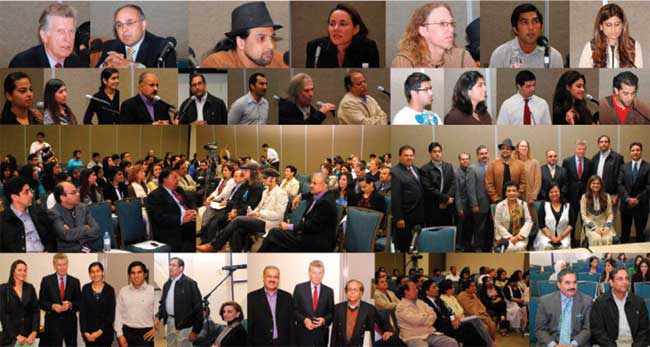A Stimulating Informational Talk on Pakistan at UC Irvine
A
Pakistan Link Report
Pictures by Faiz Ahmed

Glimpses of the informational talk
The Pakistani Student Associations and the Council of Pakistan American Affairs (COPAA) joined hands in organizing an informational talk on “Understanding Pakistan: The Future of Democracy” on May 28, 2009 at the University of California, Irvine.
The talk featured Dr Stanley Wolpert, distinguished Professor Emeritus at the University of California, Los Angeles and an eminent scholar on South Asia; Consul General Syed Ibne Abbas, an outstanding diplomat and conscientious Pakistan Foreign Service officer; Dr Mark Levine, Professor of History at the University of California, Irvine;Dr Lorna Seitz, Acting Director of Research and Training, International Consortium for Law and Development; Dr Salman Ahmad, UN Goodwill Ambassador and founder of rock band Junoon; and Sher Ali, 4 th year political science major at the University of California, Riverside and founder of UCR’s Pakistani Student Association. Anila Ali, a COPAA Board member, acted as the moderator.
During the first session each panelist was asked a question from a list of topics compiled by members of the PSA and COPAA. The questions were topical and addressed the issues that Pakistan is confronted with today. The second session was an open discussion in which the moderator introduced a specific topic and the panelists enlightened the audience with their perspective. The third session saw the panelists taking questions from the audience.
The three sessions produced a stimulating discussion on the current situation in Pakistan. The panelists as well as the audience gave a good account of themselves and the discussion remained absorbing throughout the evening. Each participant furnished an illuminating perspective on the topic buoying hope and optimism about the future of Pakistan. At times, the arguments were heated and emotionally charged.
Professor Stanley Wolpert was emphatic in pointing out that Pakistan was not conceived as a theocracy. Quoting from the speeches of the founder of the nation, Quaid-i-Azam Mohammad Ali Jinnah, he furnished incontrovertible evidence in support of his argument. "The founder of your nation believed in democracy." He had envisioned a modern, progressive state, Wolpert forcefully argued. The country's salvation from the present crisis lies in fostering an attitudinal change - "to be in step with the rest of the world." Education could play a catalytic role in ushering the wholesome change. Prof Wolpert felt that " Pakistan itself must energize young people” which could lead to a "tremendous movement." Resultantly, people could be part of a program to realize the dream of the founding fathers.
Consul General Ibne Abbas did not let any negative remark about Pakistan go unchallenged. He remained focused in his defense of the country and strongly rebutted the view that Pakistan is a failed state. "We are not isolated" either, he contended and claimed the "nation, friends and the world is coming to our aid."
The current setback and problems stemming from the military operation constituted a "temporary phase and phenomenon" in the history of the country. He cited robust economic development, independent judiciary and fully functional democratic institutions in support of his argument. "You will see positive results. We can manage things. We have lots of resilience," he contended.
A member of the audience made the incisive point at this juncture: " Pakistan is not a failed state but a country that has been in a perpetual state of failed leadership." His observation won spontaneous applause.
Dr Salman Ahmad claimed that "music is in the genes of the younger generation." "Dil, dil Pakistan started a movement," he triumphantly contended and "inspired young Pakistani artists to discover their creativity." The Taliban are united, he warned. "We should be united in opposing them." One way of achieving unity would necessitate that the yawning gap between the rich and the poor is narrowed.
Professor Mark Levine seemed to support this view as he recounted impressions of his visit to the Islamabad Islamic University where he was a witness to "progressive thinking" among the students. He thought structural changes were needed to alleviate poverty and bridge the growing disparity in the economic conditions of various segments of Pakistan’s population.
DrLorna Seitz also speaks positively about her visit to Pakistan. "Women have been listened to," she claimed. She strongly felt Pakistan should have a government that "responds to the needs of the people."
The three American professors - Dr Stanley Wolpert, Dr Mark Levine and Dr Lorna Seitz - spoke with rare candor and aired identical views on one point: there was a pressing need to bolster the education sector in Pakistan.
Young Sher Ali too spoke with great clarity. His voice resonated in the hall as he observed that Pakistan had no option but to promote democracy to sustain its march as a forward-looking, progressive state in the 21 st century.
Anila Ali conducted herself admirably as moderator of the proceedings. The panel members and the audience demonstrated equal exuberance and perspicacity to make the proceedings lively and meaningful. The Pakistan Student Associations and COPAA deserve to be congratulated on arranging the highly insightful informational talk.
-------------------------------------------------------------------------------------

